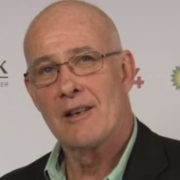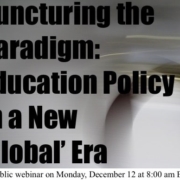Global citizenship education is an idea you’ve probably heard about. It’s fairly straightforward as an abstract concept.
Much attention on global citizenship education today is to ensure that certain values are taught in school despite the ever-growing demands on students from subjects like Science, Math, and Language.
But how can global citizenship education be measured? What tools exist to incorporate global citizenship education across the curriculum? That’s much more difficult.
The Center for Universal Education at the Brookings Institution, UNESCO, and the UN Secretary General’s education first initiative youth advocacy group convened a working group of 88 people to catalog practices and tools in use around the world that measure global citizenship education. They found some innovative ways to measure the concept.
With me today is Jasodhara Bhattacharya. She was one of the lead members of working group from Brookings, which resulted in a report entitled Measuring Global Citizenship Education: A Collection of Practices and Tools.
Citation: Bhattacharya, Jasodhara, interview with Will Brehm, FreshEd, 88, podcast audio, September 25, 2017. https://www.freshedpodcast.com/bhattacharya/
Transcript, translation, and resources:
Will Brehm 2:02
Jasodhara Bhattacharya, welcome to FreshEd.
Jasodhara Bhattacharya 2:05
Thank you.
Will Brehm 2:06
How did you, or how did this report define global citizenship education?
Jasodhara Bhattacharya 2:13
That’s a very interesting question, Will. Basically, in order to corral this rather fuzzy field of global citizenship education, we ended up looking at a variety of different other fields that inform what global citizenship education is. So, for example, in the field of education for sustainable developments, environmental education, that has a lot of aspects that feed into global citizenship education. Peace education, human rights education, and a variety of different other fields. So we looked at a way to come up with a common theme that basically emerged from these fields. And we we thought that a common theme that would encompass the ethos that was present in these fields is this ethos of “valuing yourself, valuing others”. So the idea of human dignity is something that we could latch on to as a common theme to try and get the work started in terms of looking at various programs that might fit the bill for global citizenship education.
Will Brehm 3:54
So what would be the meaning of “citizen” in this sense?
Jasodhara Bhattacharya 3:59
A citizen in this sense is not a citizen in the way we mean national citizenship. And that’s actually one of the contentious elements of global citizenship when it comes to being mainstreamed or being spoken about. Because we are so used to thinking of the term citizen in terms of a national citizen; someone who has a passport, and therefore someone who has a connection to a nation state where the nation state has obligations towards you just as you have obligations towards it. So it’s that pact. We are so used to conceiving of the term citizen in those terms, that when we come across global citizenship, it becomes a false tension where you think that because you are, quote, unquote, a “global citizen”, you don’t need to be a national citizen, or somehow national citizenship is diluted in the sense of an identity that might be more global. So citizen in this case is not really in that tension. Or that’s how we conceived of it. Because a global citizen is someone who thinks of themselves as part of a larger family. And that larger family could be your community, that larger family could be your country, that larger family definitely encompasses the world as a whole. Because the reality is, we now know, that everything that we do has an impact that has a broader range of fall out, let’s say, than we did 50 years ago, because we are living in a highly interconnected world. So global citizen would be someone who’s aware of their place in that highly connected world. That whatever they do has an impact on that larger world, on these larger networks. And vice versa, that these larger networks also have an impact on them. And ideally, this is a person who is also able to navigate those interactions. So if they wanted to impact that larger network, they know how to go about it. Or at least have some sort of idea of how to go about it. And also, they are aware that this larger network has an impact back on them as well.
Will Brehm 6:54
So in this sense, the “global” is not simply a collection of nation states.
Jasodhara Bhattacharya 7:01
Yes. The term global here refers to a holistic planet as a whole. Because there is no mechanism in place, in practical terms, there’s no mechanism in place for having a quote, unquote, “global citizenship”. That would be the same as having a passport, right? So there’s no global passport. So if I am a citizen of the United States, and I’m overseas traveling somewhere – so let’s say I’m overseas traveling in Japan – the person responsible or the entity responsible for my health, well-being and safety is still the ….. well, hopefully you’re treated well in whatever country you visit, but ultimately, you go back to your embassy for example or your consulate, because that’s the passport that you have. And there’s no similar analogy for a global citizen. So we’re not looking at this larger world order because that is something that’s in a theoretical space that people talk about, but that’s really not the sense of what a global citizen is at this day and age, because there’s no such mechanism in place to do that. So it’s basically conceiving of global citizens as people who value themselves, value others, value their environment, and have a long term vision for their future as members of stable, sustainable societies, and realizing that their actions have an impact on those larger societies and vice versa; that those larger societies reflect that back on them.
Will Brehm 9:13
Why is global student citizenship education important? It seems like a lot of what you’re saying could actually be done by national citizenship education. I don’t see why it has to be global citizenship education that teaches human dignity.
Jasodhara Bhattacharya 9:28
Right. And there is a lot of that within the national systems. So for example, there’s the ICCS surveys that come out and they look at, “Well, how do different national education systems conceive or deliver national citizenship?” So with global citizenship, we wanted to get across a sense of the interconnectedness piece. Because we are impacted by a lot of events that are global in nature. And therefore we have to have the skill set to navigate those global events. So for example, if you can look at climate change, that’s a global level event which affects everybody. And you cannot impact climate change by individual action. It has to be collective action at the global level. If you look at issues of violent extremism, if you look at issues like the refugee crisis that happened in Syria, these are all events that are global events that have to be acted on at a collective national level. And these are just recent events that are dawning on us, and we don’t know what other major global events will be coming up on the horizon. And to tackle those global level events, you need a global mindedness in terms of your thinking. And so the sense of the interconnections that exist, and these networks that exist, so systems level thinking, is what is required. And that is where the idea, and we wrestled in the working group, when it was first being hatched out of the learning metrics taskforce in terms of, “What do we call this?” Because this is an area of education that seems necessary. So what do we call this area of education? And eventually, we settled on the phrase “global citizenship education”. And this, of course, was also very opportune because it aligned with what the UN Secretary General, Ban Ki-moon had said at the dawn of the Sustainable Development Goals that we want a universal, integrated and transformative vision for a better world. And the Global Education First Initiative actually had in it global citizenship education as well. So that was a great piece of alignment with the work that we were doing. That was also at the dawn of the Sustainable Development Goals at the 2030 era, this just seemed to be the right fit.
Will Brehm 13:09
So how is global citizenship education actually practiced around the world? I understand the connection that from the UN and a lot of these lofty ideas, but what does it look like in practice?
Jasodhara Bhattacharya 13:25
Our report, or the work that we did, we weren’t trying to replicate the work of, for example, the ICCS report which is going to come up, which will look at global citizenship education at a systems level. So what we were trying to do was actually look at practices, specifically assessment practices and assessment tools that exist at up to the system’s level. So how is it done in terms of assessment practices, for example, in a school district, or within a family of schools within a nation? And that could be all the different schools in the nation. So how is global citizenship education being practiced? And we weren’t looking at the policies, per se. We were looking at the actual tool itself. Because, of course, policy can state, “Yes, we will do global citizenship education. We will assess it, and these are the things that we value.” But until you look at the assessment tool itself, you don’t really know whether that reflects what is going on on the ground. So the assessment tool is really an artifact that tells you what it is that is being valued. So, to borrow a phrase, “Are we measuring what we treasure?” so to speak. So we looked at a variety of different assessment tools, and the easiest assessment tools that we came across in terms of access for everybody without requiring special permissions from various ministries, these were in the not-for-profit sector, and the not-for-profit sector has many programs that have been using these assessment tools for a very long time. These are highly established programs that have scaled. And so those are the tools that we looked at, because the other piece about global citizenship education is that there is an action component. So there are relatively a handful of programs out there around the world that require some sort of action component. One of the programs, for example, is the International Baccalaureate program. The International Baccalaureate, in order to graduate from it, you require a participatory component in your assessment. But there are not that many of those out there. So that’s why we focused in on the wide field that is represented in the non-profit sector to see what was going on there.
Will Brehm 17:07
So take me through some of these measures. How do you actually measure human dignity? If human dignity is the value that underpins global citizenship education, how on earth are people measuring it?
Jasodhara Bhattacharya 17:23
There were three components. So there were a couple of different pieces. One of them was the initial work that we did in the global citizenship education working group where we hashed out what did we think were competencies. Like, we say “global citizenship”, so what do we mean by the competencies in this this area? So how we define global citizenship competencies was that they were eight different pieces to it. And some of these pieces would be more global in nature. So the competencies were things like empathy, critical thinking, problem solving, ability to communicate and collaborate with others, conflict resolution, sense and security of identity, shared universal values (such as peace, justice), we also put in human rights, but there was debate in the group about the human rights aspect. Because of course, “human rights” is a contentious phrase as well in many different parts of the world. And we wanted to really engage as many people as possible with the work that we were doing. However, we still decided to go ahead and put it in there. Respect for diversity, intercultural understanding. And last but not least – because these are not stacked in any way in terms of order of importance – the recognition of global issues such as interconnectedness, and whether it’s social interconnectedness, economic or environmental. Now, at the same time, or shortly thereafter, because our work went on hiatus for a little bit. And then shortly thereafter, we also had the UNESCO global citizenship education report, which categorized global citizenship under three domains: so you had the cognitive, the socioemotional, and the behavioral domains. And each of those domains of course looked at different aspects of global citizenship education. And so in our report, what we try to do is we try to kind of synthesize all of that together, because we didn’t want to leave anyone out so to speak, and the UNESCO report was very detailed and had lists of a lot of these topics that we could really hone in on alongside our global citizenship competencies to see what kinds of programs are there assessing these various aspects.
Will Brehm 20:20
So for example, taking one of these competencies of empathy, what would be a good measure that you review to assess or measure empathy?
Jasodhara Bhattacharya 20:38
There are some programs that do it cognitively, where you can define various competencies or define various elements of global citizenship. So that’s one way to go about it, which is in the cognitive domain. But one of the more interesting assessment pieces that we came across, or that we looked at, included programs like US FIRST Robotics, for example. US FIRST Robotics is really interesting because it’s a STEM program for people who don’t know. So it’s a science, technology, engineering and mathematics program. That is a program where children get together, they put together a robot, but that’s really not the purpose of the robotics program. The purpose of the robotics program is to build this community of practice. And so they codify measuring basically, an element, I would say, of empathy in something called “coopertition”. So the idea is, you cannot win this competition, this robotics competition, by yourself. You have to collaborate with others. You are observed during competitions, in terms of, ‘Do you go out of your way to help other teams who are your competitor teams if they are in need of assistance?’ So for example, if their robot breaks down, or if they’re looking for equipment, or if they need a bit of expertise. Do you go out and collaborate with these teams? Before the event happens, do you actually mentor teams that even might be your competitor teams? And the highest award that you can get, or the most coveted award you can get is not the award where you win the competition, it’s called the Woody Flowers Award, which is basically a portfolio that you have to submit that is assessed. And it’s basically looking at you being a good global citizen: you actually being empathetic as a group, resolving conflict, helping one another, and respecting each other. So it’s all of these elements that are observed for in a high stress situation, which is the competition. Or at a lower level, at the level of elementary schools, they do it through games, for example, that people play, to see how well people interact with each other. And so that is a very intriguing way of assessing because you are assessing through a performance rather than assessing through, “Actually, can you define all of these elements of global citizenship?” And in fact, this idea of assessing through a performance emerges over and over again in a variety of these different programs. So another interesting program that just appeared in our survey that was a fairly new program was CorStone, which was developed using a lot of the positive psychology field that is now emerging as a very powerful field to look at in terms of human behavior and all of those aspects. And so the CorStone program did something similar, which is that they have this series of different lessons that you go through, and during the lessons you are observed and formatively assessed. So you are assessed at different points in time in the learning trajectory, as opposed to being assessed right at the end on paper and pencil. You’re assessed at different points in the learning trajectory to see whether or not you are understanding all of these different elements of what we would phrase as global citizenship education.
Will Brehm 25:57
So the US FIRST Robotics and the CorStone, are these programs that are being devised and implemented inside public schools? And in what country? The US FIRST Robotics, that seems to be in the US. What about the CorStone?
Jasodhara Bhattacharya 26:13
CorStone is implemented in the developing world. Specifically, it’s a girls education program that basically went to the villages in Bihar in India, where there’s a lot of different challenges that are faced by girls in that region of the world. And so they went out and try to impact that specific population, and that’s where it kind of blossomed out.
Will Brehm 27:02
Is the CorStone program implemented inside public schools, or is it a separate program?
Jasodhara Bhattacharya 27:10
No, it wasn’t delivered through the formal public school day. The US FIRST Robotics program, which is international, so you have a lot of US schools and some Canadian schools that participate in North America. But then you also have schools all around the world participating as well. Now, that program can be delivered flexibly. So it can be delivered within school; there are some schools that deliver the program through the school day itself, whereas others deliver it in an extra-curricular fashion. Which is interesting, that the programs around global citizenship education, the assessment tools around them that these emerged out of the non-for-profit space, which is in the informal learning spaces, a lot of them. Because in the formal learning spaces of course, what is really valued are other subjects such as mathematics, literacy, science. And so the space for doing what we would consider global citizenship education often then falls into this external space, as opposed to being a systems wide implementation. And we looked at the adolescent years, specifically correct. That’s basically the area of our focus. So we didn’t actually look at, for example, early childhood education, or middle school education. We were considering more the young adult and adolescent, so “youth”, as the United Nations defined it; that sector of the population that’s called youth, and programs that actually impact youth.
Will Brehm 29:37
It’s very interesting that a lot of global citizenship education is being implemented in the non-formal sector, whereas it’s not necessarily appearing inside formal schooling as we know it. Why do you think there’s so many international agencies or non-profits or think tanks that are interested in global citizenship education today, and we don’t see the same sort of push inside formal schooling?
Jasodhara Bhattacharya 30:08
I think that it’s the legacy of how we do formal schooling. If we really look at formal schooling, where it came from, it came out of the labor market, so the need to basically “educate”, quote, unquote, or skill a population for the labor markets of the Industrial Revolution. So the priority was not teaching people to be empowered citizens. It was a functionalist paradigm at that point. So the priority is, ‘Can you be a productive participant in the economy?’ That is where the legacy of formal public schooling comes out of, as is practiced in the majority of the world today. And because that model spreads with, of course, colonization. So when we consider public formal schooling, that is still one of the important aspects of formal public schooling is that we want to make sure that people have the skills to actually be productive participants in the economy. And there’s always been this tension between the functionalist paradigm and the transformative paradigm, which is ultimately we want people to live peaceful and dignified lives and value the dignity of others in their area. And so there are various different programs in formal education. For example, 21st century skills education, or moral education, peace education, character education, life skills education. You can do education to develop leadership skills, even sports education. And sports is actually one of the big vehicles for delivering a lot of values based education. For example, there’s a program that …… we had to restrict how large the compendium would be, but there’s a program that is called Magic Bus that came out of India, which delivers global citizenship education through sports. And so it’s all of these different areas that tend to be marginalized in most cases in the formal schooling system. So it is a legacy of where formal public schooling came out of. Now, of course today one of the key elements of being a participant in a productive and sustainable and stable economy would be to have the 21st century skills that relate to global citizenship education. Because if you are going to participate in the economies of today, it’s no longer the Machine Age of the Industrial Revolution. We’re now going into an era where you need these much softer competences to collaborate with people from disparate viewpoints, to navigate a very interconnected economic space. And we also need people to understand aspects that would, for example, lead them to lead better and more dignified lives and not seek paths of violence, which is extremely destabilizing. And if we look at the impact on the world of paths of violence, it’s absolutely awful. And all of that comes back to affect everybody. So what was at one point a luxury to teach is now an essential to teach. And so that is why all these other bodies have become interested in global citizenship education, and we are now seeing a swing towards – in terms of the conversation, if not in terms of the practice, definitely in terms of the conversation – towards the other aspect of education that’s not just the purely functionalist. Which is, we want to have an education system that also prepares people to be positive participants in society because you cannot please everybody all the time. So that prosocial element, that moral imperative of education is now being reinserted back so you’re getting the heart of education being reinserted back with global citizenship education.
Will Brehm 36:01
I did a show with Andy Green a few months ago, and he shows very clearly that formal schools have always had this dual purpose of human capital development, as you said. But also social cohesion. That has been one of the main features of formal schooling, even if it has this legacy of human capital and preparing students for the future. So I guess, I’m a little concerned about pushing global citizenship education as in a sense replacing formal schooling or because formal schooling is failing in some way. I don’t know if that’s really the narrative to construct.
Jasodhara Bhattacharya 36:47
So let me clarify that. I’m glad that you mentioned about that tension between human capitalism and social cohesion. The space of public formal schooling has been definitely a space to build social cohesion, because that is really the space where you have all of these communities come together. And that is where we impart values. However, that has always existed in tension with the human capital aspect of things. That tension doesn’t mean that there’s a conflict, that tension just means that you have a dual purpose, and sometimes the duality of that purpose weighs more heavily on one side than on the other side. If, for example, we look at a subject area like STEM, one of the areas that we always think about in terms of anything to do with citizenship education, which is part of global citizenship education. So when we were spanning programs, we looked at programs that, for example, civics education and citizenship education in addition to like 21st century skills development, and all of these other areas. All of these other different spaces that we kind of tried to corral with this border, so we had to border all of these different spaces under this umbrella term of global citizenship education in order to surface some of these trends and some of these tools. The tension that has existed between the human capital purpose and the social cohesion purpose of schooling, which again, is not a conflict, it’s just that sometimes one is more than the other. So one of the recommendations that came out of the United Kingdom, for example, years ago, I think it was in the ’80s, was that if you do not deliver citizenship education, for lack of a better term, through what are considered core subjects like mathematics, literacy, science and technology. If you don’t deliver the value space aspect of what the purpose of schooling also is throughout, then that gets marginalized. And in fact, when we look at science and technology, these are extremely rational fields, or they’re thought of as extremely rational fields. So in all schools, there’s a hidden curriculum. We teach values sometimes by what it is that we include and what it is that we omit. So even in fields such as science and technology, which are conceived of as extremely rational fields, there are values that we are constantly imparting. The idea with global citizenship education, and the idea with it now being so high profile and being talked about by a variety of different actors, is that we are explicitly looking at addressing these various aspects, these values that sometimes can get lost in the shuffle. So, therefore, by explicitly talking about things like global citizenship education in discourses when it comes to what do we do in terms of education systems? We can actually start reemphasizing that there is indeed a dual purpose.
Will Brehm 41:24
Well, Jasodhara Bhattacharya, thank you so much for joining FreshEd. It was really wonderful to talk today.
Jasodhara Bhattacharya 41:30
Oh, thank you. Thank you so much.
Measuring Global Citizenship Education










